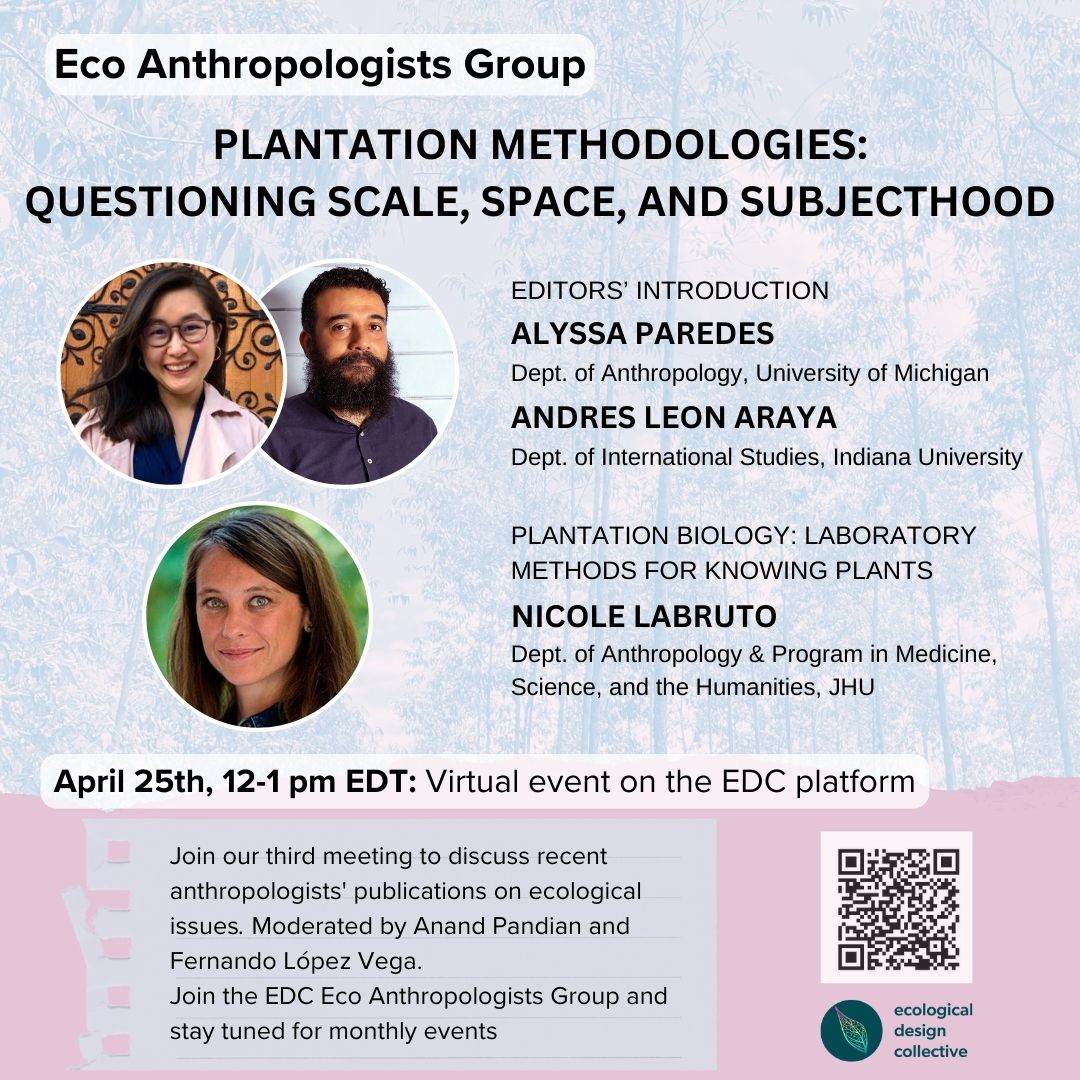
- This event has passed.
EDC Eco Anthropologists Group: Plantation Methodologies: Questioning Scale, Space, and Subjecthood with Alyssa Paredes, Andrés León Araya, and Nicole Labruto
April 25, 2024 @ 12:00 pm – 1:00 pm EDT

Join the EDC Eco Anthropologist Group for a conversation with anthropologists Alyssa Paredes & Andrés León Araya about their new edited series “Questioning Scale, Space, and Subjecthood,” along with Nicole Labruto and her contribution to this collection entitled “Plantation Biology: Laboratory Methods for Knowing Plants.” This will be our third session in monthly meetings to discuss recent anthropologists’ publications on ecological issues. Join EDC curator Anand Pandian and moderator Fernando López Vega (JHU Anthropology) for a virtual meeting with the authors about this engaging work.
Thursday, April 25th, 2024
12-1 pm (EDT)
EDC Eco Anthropologists Room: https://community.ecodesigncollective.org/bbb-room/eco-anth-room/
Access code: eefa91
Alyssa Paredes, Shophie Chao & Andrés León Araya. 2024. “Introduction,” In Intervention Symposium – Plantation Methodologies: Questioning Scale, Space, and Subjecthood, Antipode Online, https://antipodeonline.org/2024/01/04/plantation-methodologies/
Excerpt: This Intervention Symposium makes an innovative, multidisciplinary contribution to plantation-centered scholarship by reflecting on how plantations are experienced, understood, researched, and theorized across space and time. It does so by examining plantations through the interconnected lens of scale, space, and subjecthood. Scale brings us to problematize, rather than take for granted, how the spatiotemporal reach of plantations and attendant supply chains shape their social, ecological, and economic repercussions in and across different places, periods, and communities of life (Brenner 2001; Hecht 2018; Herod and Wright 2002; Marston 2000). Space brings us to consider how plantations reconfigure the spatial and geographic positioning and interconnections between the diverse entities who benefit or suffer from plantation proliferation, both human and other-than-human (Heynen 2018; Li 2018; Sheridan 2016; Wolford 2021). Subjecthood brings us to consider the kinds of beings, persons, and relations produced or undermined by plantation expansion, together with the agencies afforded or denied to them under different plantation regimes (Li and Semedi 2021; Sharpe 2010). Together, these three elements form the core of our critical reflections on the methodological opportunities and challenges involved in investigating the plantation across its diversely situated manifestations.
Nicole Labruto. 2024. “Plantation Biology: Laboratory Methods for Knowing Plants,” In Intervention Symposium – Plantation Methodologies: Questioning Scale, Space, and Subjecthood, Antipode Online, https://antipodeonline.org/wp-content/uploads/2023/12/7_Labruto.pdf
Excerpt: What regimes of practice guide molecular biologists who create transgenic plants in laboratory environments? How do scientists know their plants such that they can affect these intimate and permanent transformations? How do these scientists imagine the future fields they hope their plants will occupy? To answer these questions, I participated alongside biologists in the practices and engagements required to genetically modify sugarcane. But as I wielded a shovel or machete in the lab’s experimental growing fields, gripped a scalpel through gloved hands to prepare plant specimens for tissue culturing, or assessed the outcomes of modification attempts by examining striated PCR analysis results on a computer screen, I found myself continually looking beyond prescribed protocols, taking interest in what the plants were up to amidst humans’ interventions and manipulations. An additional question emerged: what role did sugarcane itself—a colonial crop that requires exceedingly labor-intensive processing in fields and mills—play in undergirding, advancing, and thwarting plantation biology in practice? To answer this, I looked to the biologists’ reactions to the doings of sugarcane plants.



Responses